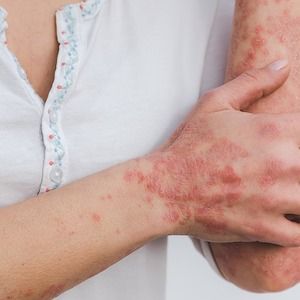Article
Study Finds Spesolimab Helps Prevent Generalized Pustular Psoriasis Flares
Author(s):
New clinical trial data shows benefits of spesolimab for GPP flares, providing compelling evidence for IL-36 signaling’s effect on the condition’s pathogenesis.

Spesolimab is effective in 84% reduction of risk for generalized pustular psoriasis (GPP) flares over the course of 48 weeks compared to placebo, according to new late-breaking data.1
In this study, spesolimab was shown to have substantially diminished flare risk by 84% over the course of 48 weeks, and the 123 study participants showed no flares following 4 weeks of treatment in the high dose arm of the study.2
This new data resulted from the EFFISAYIL 2 trial, the largest and the first multinational randomized clinical trial evaluating treatments for GPP flares prevention.
Spesolimab, an approved GPP flare treatment, is a novel, humanized, selective antibody known to block the activation of the interleukin-36 receptor (IL-36R). This is a signaling pathway in the body’s immune system which is involved in autoinflammatory disease pathogenesis.
“These results provide further compelling clinical evidence for the role IL-36 signaling plays in the pathogenesis of GPP,” Bruce Strober, MD, PhD, Clinical Professor, Dermatology at Yale University, said in a statement. “Moving forward, our hope is that dermatologists not only have a specific treatment for GPP flares, but that we can effectively prevent them in the future.”
Flares in patients with GPP are characterized by pustules on the body which are known to be painful and to frequently lead to emergency care, in addition to potentially causing near fatal complications such as shock, organ failure, and sepsis.
The uncertainty GPP patients live with regarding the possible effects of their next flare that might occur can emotionally burden patients in a substantial way.
Fortunately, the GPP drug has already been given a Breakthrough Therapy Designation from the US Food and Drug Administration (FDA) for investigational treatment of flares in GPP patients.
"Through our comprehensive EFFISAYIL clinical program we have already delivered spesolimab as a major advancement for flaring GPP patients," Carinne Brouillon, Head of Human Pharma at Boehringer Ingelheim, said in a statement. "The EFFISAYIL 2 trial results build on this success bringing us closer to achieving our ultimate goal of a flare-free future for everyone living with GPP."
In the phase 2 trial known as EFFISAYIL 1, it was found that administering a solitary intravenous infusion of spesolimab led to swift alleviation of pustular and skin symptoms in those experiencing flares.3
The positive result persisted for a duration of 12 weeks when up to 2 doses of spesolimab were administered.
These findings played an essential role in obtaining regulatory approval for spesolimab, which became the pioneering targeted therapy for managing such flares in adult patients.
References
- Boehringer Ingelheim. Spesolimab Prevents GPP Flares. Boehringer Ingelheim website. Published 2023. Accessed July 5, 2023. Available from: https://www.boehringer-ingelheim.com/human-health/skin-diseases/gpp/spesolimab-prevents-gpp-flares
- Lebwohl M, et al. Spesolimab for the prevention of generalized pustular psoriasis (GPP) flares: Results from the randomized, placebo-controlled trial Effisayil 2. Abstract presented at the 25th World Congress of Dermatology July 2023, Singapore.
- Bachelez H et al. Trial of spesolimab for generalized pustular psoriasis. NEJM. 2021;385:2431–2440.





